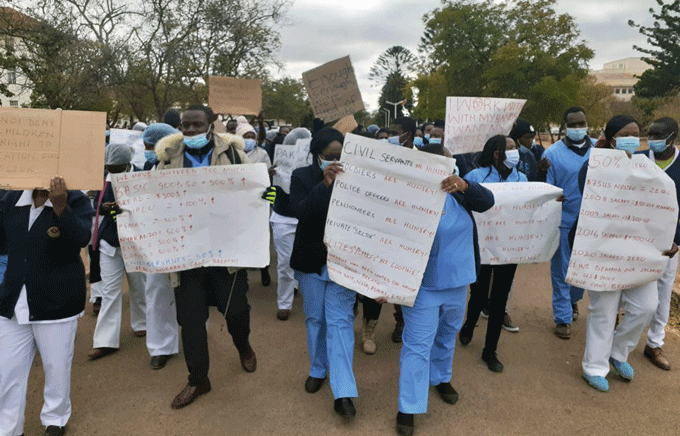
BY MIRIAM MANGWAYA HEALTH workers are up in arms with Health Apex council leaders whom they accuse of nicodemously cutting a deal with the government to end their weeklong strike.
Nurses and other health workers downed tools on June 20 protesting poor pay and working conditions, grinding the country’s troubled health sector to its knees.
They are demanding United States dollar salaries to make ends meet in the face of a collapsing local currency amid skyrocketing prices of basic goods and services.
The Health Apex, which is made up of union officials representing workers in the health sector, yesterday issued a statement saying they were calling off the strike and giving the government two weeks to address their grievances.
But the announcement was received with scorn by unions who accused the Health Apex of throwing workers under the bus after allegedly receiving bribes.
“That decision that we have called off the strike was not by consultations with the apex leader,” said a union leader who preferred anonymity.
“Workers are angry because there is no hope that government will take heed of our concerns.”
Zimbabwe Professional Nurses Union Douglas Chikobvu said they were forging ahead with their strike until their demands have been met.
- Chamisa under fire over US$120K donation
- Mavhunga puts DeMbare into Chibuku quarterfinals
- Pension funds bet on Cabora Bassa oilfields
- Councils defy govt fire tender directive
Keep Reading
“As ZPNU we were so disturbed given that the key stakeholders, who are the members were not consulted.
“Nothing tangible was addressed so there was no need to call off incapacitation prematurely,” Chikobvu said.
“We hope the Health Apex learns from their mistakes and respects the members.”
Health Apex team leader Tapiwanashe Kusotera yesterday insisted that the strike had been called off.
“There is no guarantee that government will address our concerns but we cannot move forward without extending an olive branch and acting in good faith,” Kusotera said.
“We hope that government will respond unlike in previous strikes that have gone for hundreds of days.
Patients have been left stranded since Monday, with some hospitals forced to discharge those that had been admitted.
Zimbabwe Government Radiographers Association president Sibanda said government’s inaction on their plight and that of stranded patients betrayed its insincerity.
“Under normal circumstances, a day or just a few hours long strike should trigger action by authorities, but what have we seen -weeks and months of workers downing tools without the employer acting,” Sibanda said.
The unions also accused government of closing all room for genuine negotiations.
This was after government announced plans to ban doctors and nurses from embarking on strike for more than three days under new proposed amendments to the Health Services Act.
Community Working Group on Health executive director Itai Rusike warned of a massive brain drain in the health sector.
“In the absence of a good industrial relations system, this has been met with patience by the workforce but that patience is limited as demonstrated by the current strike action,” Rusike said.
“Our biggest threat and challenge to the public health sector is the health worker out-migration as they will continue resigning, packing their bags and leaving in large numbers, thereby exacerbating the health crisis.”
There are no statistics on the number of nurses that have left the country in the past two years but statistics put the figure at just over 3 000.











